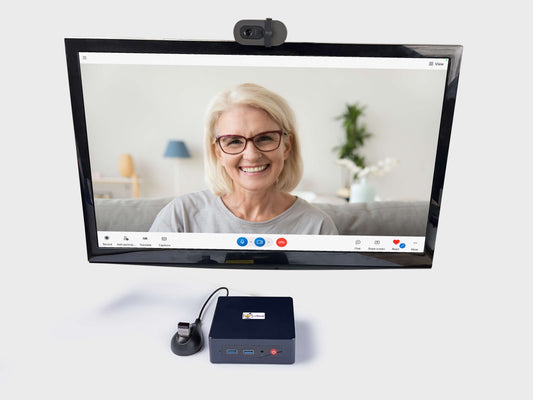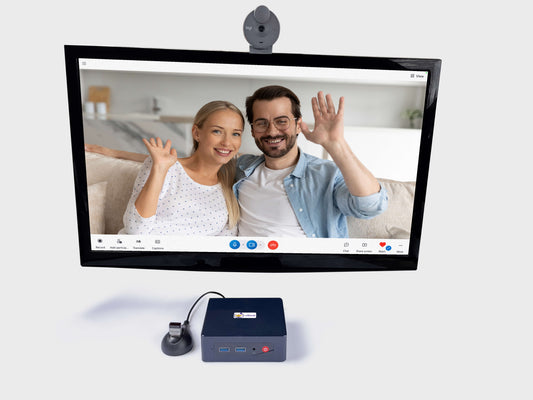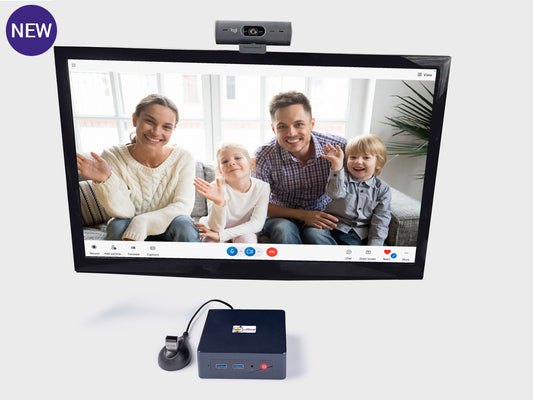For as long as they could remember, Pauline and Marian, both lifelong users of British Sign Language (BSL), had shared a special bond. Their friendship was filled with shared experiences and heartfelt conversations in sign language, often over video calls. However, as Pauline’s eyesight deteriorated to the point of being registered as partially sighted, using video calling on small devices became an even greater challenge. Born deaf, Pauline had limited access to written English and often felt worried and confused by update notifications and messages on her mobile phone. She frequently missed calls and messages, unsure of how to respond.
This combination of visual impairment and difficulty navigating text-based communication made mainstream devices increasingly difficult for Pauline to use, deepening her sense of isolation.
Pauline’s deaf support worker, Laura Wilcock, saw how this growing isolation affected her. Laura knew that staying connected with loved ones was vital for Pauline’s well-being, but it was clear that mainstream technology wouldn’t work. Pauline needed something simple and accessible—free from the confusion of buttons or apps and with a large screen that could handle the nuances of sign language communication.
A Lifeline Found
Eager to assist, Laura set out to find a solution that would keep Pauline connected in a way better suited to her needs. That’s when she discovered CallGenie—an auto-answering, button-free video communication system that connects directly to Pauline’s television. Using a large screen, Pauline can see facial expressions and full signing movements clearly without pressing any buttons or navigating apps. Once a call ends, the television returns to its previous state, so Pauline doesn’t have to worry about managing settings or switching between channels.
The transformation was immediate. Pauline could now effortlessly receive video calls, and the first person she reconnected with was Marian. After struggling with missed calls and technical frustrations, the friends found a solution that allowed them to communicate easily again.
With CallGenie, they quickly fell back into their old rhythm, planning their days and chatting as if no time had passed. One of their most exciting plans? A long-awaited holiday! Through CallGenie, they shared every detail—from what to pack to their dream destinations—reconnecting like before. The ease of communication brought back their connection and made their bond stronger than before.
Peace of Mind for Laura
For Laura, CallGenie was a huge relief. Before, she would worry when she couldn’t reach Pauline. If Pauline didn’t answer her mobile phone, Laura had to rely on neighbours to check-in. Now, with CallGenie, she could drop in on Pauline directly via video calls on the television. No more waiting or wondering—just a quick check-in, and Laura could see that Pauline was safe and well.
“It’s been such a relief,” Laura said. Since installing CallGenie, I can now do quick welfare checks with Pauline between my other appointments. I also call her before I come over to see if she needs anything from the shop. It’s so much easier for both of us.”
CallGenie also allowed Laura to facilitate three-way calls with Marian and Pauline, making it easy to discuss medical appointments or medication together. These calls kept everyone informed, ensuring that Pauline received support for her health care decisions.
Breaking Barriers in Health Care
While CallGenie has been a game-changer in Pauline’s social care, someone whose first language is BSL, it holds great potential for health care for deaf people too. Laura envisions a future where CallGenie is used to connect patients who are deaf with remote interpreters and medical specialists, breaking down the communication barriers that often exist within the NHS.
According to a recent news article from the deaf health charity SignHealth, 67% of Deaf people have no accessible method to contact their GP and 81% have had appointments where their communication needs were unmet. With video consultations through CallGenie, interpreters could join medical appointments virtually, providing seamless translation without the challenges of scheduling in-person interpreters. This would help greatly improve access to health care for the deaf community, who are often underserved in the current system.
A Future of Connection
Today, Pauline’s world is far more connected. Her close friendship with Marian is as strong as ever. Laura, too, feels more confident in her role, knowing she can provide better social care for Pauline in a way that works for them both and doesn’t impact Laura’s care for her other service users.
For the deaf community, CallGenie represents a powerful shift in social care and well-being. While it’s already transforming how Laura supports Pauline, CallGenie can revolutionise social and health care by connecting service users with support workers and patients with interpreters and medical professionals.
.



